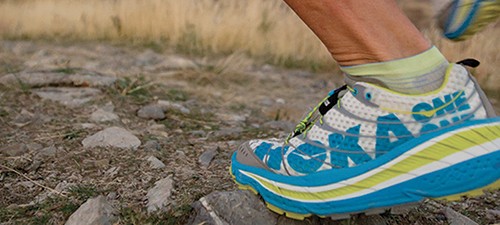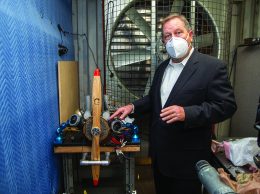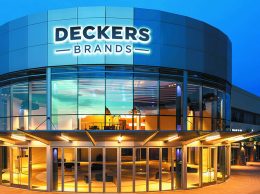Deckers makes run for athletes with Hoka
IN THIS ARTICLE
- Banking & Finance Topic
- Marlize van Romburgh Author
By Marlize van Romburgh Friday, April 5th, 2013

Deckers Outdoor Corp. has acquired Hoka One One, a running shoe brand.
Deckers Outdoor Corp., the parent company of the billion-dollar-a-year Ugg brand, has quietly acquired a small running shoe firm best known among elite ultra-marathon racers.
Goleta-based Deckers took a stake in Hoka One One in July 2012 and completed a buyout of the firm in September 2012. The brand, acquired for an undisclosed amount, adds a smaller sliver to Deckers’ massive footwear portfolio but has the potential to be a $100 million a year moneymaker within a few years, according to Hoka brand President Jim Van Dine.
“That kind of growth curve doesn’t scare us,” he told the Business Times, noting that Hoka One One (pronounced “Hoka o-nay, o-nay”) had less than $3 million in sales last year but is on track to triple that this year.
Van Dine, a former professional runner, previously worked with Deckers CEO Angel Martinez, also a former elite racer, at footwear giant Reebok after they owned a running shoe store in northern California.
As part of a small team of executives, Martinez and Van Dine helped take Reebok from a small, elite British brand to a global powerhouse that at one point was larger than Nike. Reebok went from startup to billion-dollar company within five years, Van Dine noted.
He said it won’t happen overnight, but he believes Hoka, which features a radically different shoe design, could become another leader in the lucrative running shoe business. “I told Angel: Think Nike,” he said.
What makes Hoka shoes different are their extremely elevated, springy midsole design — the shoes are so chunky, they’re almost cartoonish. The design is particularly arresting considering the trend in running in recent years has leaned toward minimalist shoes that seek to imitate barefoot running.
Hoka’s executives say despite that massive sole, the shoes are extremely light and flexible while offering the best protection from injury.
Van Dine, who has worked for shoe brands including Keen Footwear and Vans since his Reebok days, said he first learned of Hoka through Johnny Halberstadt, owner of Boulder Running Co., one of the best-known running shoe stores in the country.
“It kind of started with this mysterious voicemail I got,” Van Dine said.
He would have otherwise ignored a call touting a whacky looking shoe he’d never heard of, but Van Dine was intrigued by Halberstadt’s enthusiasm, especially given his credibility as a serious runner.
After learning more about the shoe, and hearing anecdote after anecdote from runners who said Hoka had prevented injury or even allowed them to take up the sport again after being sidelined, he agreed to try the shoes out. Soon after, he became a consultant to the brand.
“[Halberstadt] told me: They’ve got this great shoe, but they don’t have any capital,” Van Dine said.
Fast-forward two years, and Van Dine, who sold footwear brand Ahnu to Deckers in 2009, had convinced Deckers to take a small stake in Hoka.
In an interview with the Business Times in July 2012, shortly after Deckers made that first investment in Hoka, Martinez praised the brand for allowing him to take up running again.
The 56-year-old CEO said the revolutionary design provided the cushioning and support to bring him back into the sport. “They’re amazing. Look them up.” he said. “I’ve been able to take up running again as a result.”
Deckers acquired Hoka in full in September 2012. It is now staffing up the Hoka division as it prepares to build out the brand. Hoka is managed out of Deckers’ Richmond, Calif. offices, where there are about seven people working on the brand.
Hoka founders Jean-Luc Diard and Nicolas Mermoud, a pair of Frenchmen who previously worked for trail running shoe brand Salomon, will remain on board. Diard will work on Hoka’s international distribution and product innovation and Mermoud supports the brand’s sports marketing and athlete management.
According to Hoka’s marketing materials, the “unique design, shape and midsole resiliency” of the shoes “can help improve your running form, instill efficient running mechanics, softly cushion your stride and reduce the fatigue in your feet, legs and core.”
Amateur runners “will find them comfortable and forgiving,” while veteran racers “will appreciate the liveliness they put into every footstep, as well as the reduced time necessary for recovery,” the company said.
Athletes who run in Hokas include endurance runner Karl Meltzer, who currently holds the record for the most 100-mile trail race wins and was named 2006 Ultra Runner of the Year, and Dave Mackey, the 2011 Ultra Runner of the Year who most recently won the Miwok 100K.
Trying on new shoes
Deckers took Ugg from $17 million a year in sales in 1995, when it bought Ugg Australia from Australian surfer Brian Smith, to a worldwide brand with a billion dollars in annual revenue now.
Two years ago, it paid $120 million in cash for Sanuk, an Orange County-based sandal and casual shoe company. Deckers also owns Ahnu, Tsubo and Teva, among other footwear brands.
Part of the company’s recent interest in younger brands may be that Ugg brand — while by far Deckers’ biggest seller — has hit some rough patches. After a record-busting 2011, Deckers faltered in 2012. Although total sales topped $1.4 billion, compared to $1.37 billion in 2011, profits plummeted from $201.8 million in 2011 to $129 million last year.
Company executives have pinned slowing sales on warmer weather and more expensive sheepskin, the key component in classic Ugg boots.
Deckers has maintained that Ugg still has plenty of life left in it, although it admitted that it may have overestimated the price the brand is able to fetch.
“There are several aspects of our fourth-quarter performance that we believe underscore the health and relevancy of the Ugg brand,” Martinez said in the firm’s fourth-quarter earnings announcement. “We experienced strong sales for the Ugg brand on our eCommerce websites while at the same time it was widely reported that ‘Ugg’ was one of the most searched terms on the Internet during the holiday season.”
Deckers shares ended 2012 down almost 47 percent at $40.27.
Over the last year, its stock has bounced wildly between a high of $69.80 and a low of $28.53.
Sterne Agee analyst Sam Poser told the Business Times in September that Deckers is “still going to sell a lot of boots. The question, he said, is “what’s going to happen to their margins.”
In an effort to reinvigorate Ugg, Deckers has rolled out a plan to build hundreds of company-owned Ugg stores around the world within the next few years, with as many as 200 total worldwide by 2016.
It has also announced a new material called “Ugg Pure,” a 100 percent wool product that does not have the sheepskin still attached to it.
According to analysts, Deckers has said the new material is easier to procure than sheepskin but replicates the feel of fur. The material would primarily be used in sock liners and foot beds.
On March 28, analyst Randal Konik of Jefferies & Co. raised his price estimate on Deckers stock from $65 to $100. He cited moderating sheepskin prices and the new material as evidence that Deckers is getting costs under control.
Deckers shares jumped 7 percent to $56.27 after Konik’s note, and are up more than 38 percent year-to-date.
[wikichart align=”left” ticker=”DECK” showannotations=”true” livequote=”true” rollingdate=”6 months” width=”495″ height=”365″]










